Python argparse: Как вставить новую строку в текст справки?
dgv.AutoSizeRowsMode = DataGridViewAutoSizeRowsMode.AllCells;
dgv.Columns[1].DefaultCellStyle.WrapMode = DataGridViewTriState.True;
2 ответа
Начиная с описанного выше SmartFomatter, я остановился на этом решении:
class SmartFormatter(argparse.HelpFormatter):
'''
Custom Help Formatter used to split help text when '\n' was
inserted in it.
'''
def _split_lines(self, text, width):
r = []
for t in text.splitlines(): r.extend(argparse.HelpFormatter._split_lines(self, t, width))
return r
Обратите внимание, что странным образом аргумент formatter_class, передаваемый парсеру верхнего уровня, не наследуется sub_parsers, его необходимо передавать снова для каждого созданного sub_parser .
Предисловие
Для этого вопроса, argparse.RawTextHelpFormatter полезно мне.
Теперь, я хочу совместно использовать, как я использую argparse.
я знаю, что это не может быть связано с вопросом,
, но эти вопросы были побеспокоены меня некоторое время.
, Таким образом, я хочу обменяться своим опытом, надейтесь, что это будет полезно для кого-то.
Здесь мы идем.
сторонние Модули
colorama: для изменения цвет текста: pip install colorama
Делает последовательности символа ESC ANSI (для создания цветного терминального текста и расположения курсора) работой под Примером MS Windows
import colorama
from colorama import Fore, Back
from pathlib import Path
from os import startfile, system
SCRIPT_DIR = Path(__file__).resolve().parent
TEMPLATE_DIR = SCRIPT_DIR.joinpath('.')
class FormatText:
__slots__ = ['align_list']
def __init__(self, align_list: list):
self.align_list = align_list
def __call__(self, text_list: list):
if len(text_list) != len(self.align_list):
raise AttributeError
return ' '.join(f'{txt:{flag}{int_align}}' for txt, (int_align, flag) in zip(text_list, self.align_list))
@staticmethod
def text(msg, fore_color: Fore = Fore.GREEN, back_color: Back = ""):
return back_color + fore_color + msg + Fore.RESET
def main(args):
...
if __name__ == '__main__':
colorama.init(autoreset=True)
from argparse import ArgumentParser, RawTextHelpFormatter
text = FormatText.text
format_text = FormatText([(20, '<'), (60, '<')])
script_description = \
'\n'.join([desc for desc in
[f'\n{text(f"python {Path(__file__).name} [REFERENCE TEMPLATE] [OUTPUT FILE NAME]")} to create template.',
f'{text(f"python {Path(__file__).name} -l *")} to get all available template',
f'{text(f"python {Path(__file__).name} -o open")} open template directory so that you can put your template file there.',
# <- add your own description
]])
arg_parser = ArgumentParser(description='CREATE TEMPLATE TOOL',
# conflict_handler='resolve',
usage=script_description, formatter_class=RawTextHelpFormatter)
arg_parser.add_argument("ref", help="reference template", nargs='?')
arg_parser.add_argument("outfile", help="output file name", nargs='?')
arg_parser.add_argument("action_number", help="action number", nargs='?', type=int)
arg_parser.add_argument('--list', "-l", dest='list',
help=f"example: {text('-l *')} \n"
"description: list current available template. (accept regex)")
arg_parser.add_argument('--option', "-o", dest='option',
help='\n'.join([format_text(msg_data_list) for msg_data_list in [
['example', 'description'],
[text('-o open'), 'open template directory so that you can put your template file there.'],
[text('-o run'), '...'],
[text('-o ...'), '...'],
# <- add your own description
]]))
g_args = arg_parser.parse_args()
task_run_list = [[False, lambda: startfile('.')] if g_args.option == 'open' else None,
[False, lambda: [print(template_file_path.stem) for template_file_path in TEMPLATE_DIR.glob(f'{g_args.list}.py')]] if g_args.list else None,
# <- add your own function
]
for leave_flag, func in [task_list for task_list in task_run_list if task_list]:
func()
if leave_flag:
exit(0)
# CHECK POSITIONAL ARGUMENTS
for attr_name, value in vars(g_args).items():
if attr_name.startswith('-') or value is not None:
continue
system('cls')
print(f'error required values of {text(attr_name)} is None')
print(f"if you need help, please use help command to help you: {text(f'python {__file__} -h', fore_color=Fore.RED, back_color=Back.LIGHTYELLOW_EX)}")
exit(-1)
main(g_args)

